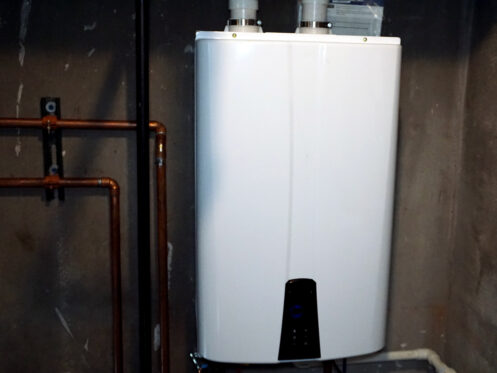The water heater in your Roseville home is essential for many daily activities such as cooking, cleaning and bathing. Because of this, you need to ensure that you make the right choice. Learning about the different types and their pros and cons can help you pick the water heater that will most benefit your family.
Conventional Tank Water Heaters
This is the most traditional and common type of water heater in homes. They store the water in a large, insulated tank.
Compared to other water heaters, this type tends to be more affordable regarding the upfront costs. A plumber can install it relatively quickly, and they are usually compatible with the plumbing systems present in most homes. Since this type is so common, it tends to be user-friendly.
One consideration is that there is a limited supply of hot water. Once you use all the water in the tank, you have to wait for it to heat another batch before you can use it again. Standby heat loss is something else to think about.
Tankless Water Heaters
Also referred to as on-demand water heaters, the tankless type can directly warm up the water without needing a tank to store it. They use electric elements or high-powered burners to heat the water while it runs rapidly through the unit.
Since this type will only heat the water as you are using it, it increases energy efficiency and eliminates the risk of standby heat loss. If your home has a high water demand, this type is ideal because it gives you a continuous hot water supply. They will also save space since there is no tank, making them ideal for smaller spaces.
Compared to a traditional water heater, the upfront costs are usually a bit higher. There are limitations to the flow rate, so if you exceed the capacity of the unit, you may not get enough hot water. Depending on the model that you choose, you might have to upgrade your electrical system or gas lines to properly install this type of water heater.
Heat Pump Water Heaters
This type of water heater moves heat from the ground or air via the use of electricity to heat the water. They do not generate heat, but they transfer it, so this makes this type of water heater highly energy efficient.
Compared to a traditional electric water heater, this type is more energy efficient. This helps to reduce the operating costs. You can use it effectively in cold and warm regions, so it is a very versatile water heater.
Compared to other water tank types, you may spend more upfront to install this type of system. When the weather gets especially cold, it may have an impact on the performance. You may need more space to use this type of water heater compared to conventional tanks.
Solar Water Heaters
This type heats the water by using energy from the sun. The system has solar collectors and these work to absorb sunlight. They then convert the light into thermal energy. There is another system to transfer this energy so that it can heat the water.
Since this type of water heater uses solar energy, it has a renewable energy source, which will decrease your reliance on gas or electricity. The operating costs are minimal as a result. They are also environmentally friendly compared to traditional water heaters since they use solar energy to heat the water.
There may be an impact on rainy or overcast days since the performance of the water heater depends on sunlight. While there may be tax incentives or rebates, the initial installation costs can be higher. You will need enough roof space to install the solar collectors. For optimal performance, orientation is critical.
Condensing Water Heaters
This is a kind of tankless water heat that improves efficiency by using combustion gases to extract additional heat. Natural gas is the usual fuel source.
Condensing water heaters are efficient due to how they heat the water. Since they can recover heat, they do not use as much energy to provide you with hot water. This also makes this type environmentally friendly.
They are more complex to install and have additional components, so the installation costs can be higher than certain other types of water heaters. The installer might need to replace or modify existing venting systems to accommodate condensing units. These water heaters have more maintenance requirements to ensure optimal performance and prevent condensate trap corrosion.
Point-of-Use Water Heaters
This is a type of compact water heater unit. If you need hot water in a specific location, such as to a specific appliance or sink, these water heaters are excellent options.
Since you place the unit to what it is heating water for, it decreases the risk of losing heat while water goes through a network of pipes, helping to increase energy efficiency. You do not have to wait for water to get hot since it gives you hot water right away. These water heaters are compact, so you can install them in a small space. If you are using this type to provide hot water to an entire house, you will usually need multiple units, so the installation costs may be higher.
Combination Boilers
This type will provide hot water and heat to your home with a single unit. This means you do not need a separate boiler and water heater.
If there is limited space, this is ideal since you only need one unit for two functions. If your home has moderate hot water and heating demands, this type can be energy efficient. You can have continuous hot water as soon as you need it.
There can be limits to the hot water flow if you are simultaneously using this unit to heat your home and provide hot water. Plumbers might need to make changes to your current heating and plumbing systems to install this unit. This type of water heater may not be sufficient for larger homes.
Electric Resistance Water Heaters
This type has a tank and uses electric elements to heat the water. They are a common water heater type.
There are no venting requirements, so installation is relatively simple. The upfront costs are lower compared to several other water heater types.
They have a limited capacity and recover more slowly, so it could take more time to get enough hot water for your daily needs. Compared to other water heaters, the operating costs may be higher.
Plumbing Experts in Roseville
Picking the right water heater for your Roseville home is vital to getting the level of efficiency and hot water that your family needs. We can help you to further explore your options so that you make the best choice. Our team is also available to assist with your home’s cooling, heating and other plumbing needs.
Call Environmental Heating & Air Solutions in Roseville to learn more about your water heater options.

